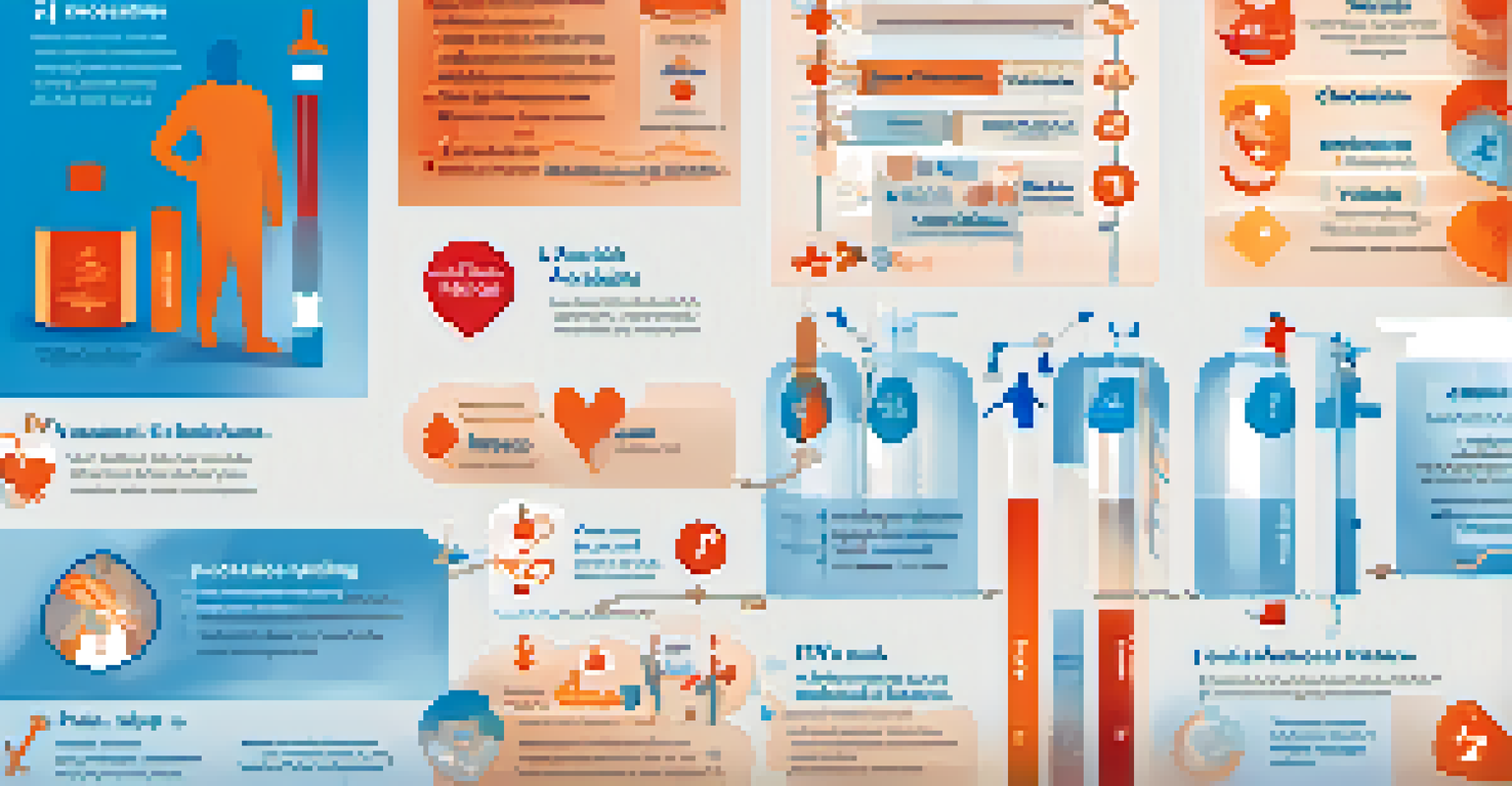Vaccination and Chronic Disease Prevention: What You Should Know

Understanding Vaccination and Its Importance
Vaccination is a crucial public health tool designed to protect individuals from infectious diseases. By introducing a harmless component of a virus or bacteria, vaccines stimulate the immune system to develop defenses without causing illness. This proactive approach not only safeguards individual health but also creates herd immunity, protecting those who cannot be vaccinated due to medical reasons.
Vaccines are the tugboats of preventive health.
The significance of vaccinations extends beyond immediate protection; they contribute to the long-term health of communities. For instance, widespread vaccination against diseases like measles has led to a dramatic decline in incidence rates. This collective immunity means fewer outbreaks and a healthier society overall, showcasing how vaccines are not just personal health choices but vital community investments.
Moreover, vaccines can prevent complications that may lead to chronic diseases later in life. For example, the hepatitis B vaccine reduces the risk of liver cancer, a chronic condition that can develop after prolonged infection. Understanding the broader implications of vaccination is essential in appreciating its role in chronic disease prevention.
The Link Between Infections and Chronic Diseases
Infections can trigger or exacerbate chronic diseases, highlighting the importance of vaccinations. For instance, certain viral infections are known to increase the risk of developing conditions like diabetes and heart disease. By preventing these infections through vaccination, we can potentially reduce the incidence of associated chronic health issues.

A great example is the connection between the human papillomavirus (HPV) and cervical cancer. The HPV vaccine protects against the strains of the virus most commonly linked to cancer development. This preventive measure illustrates how vaccines can play a direct role in reducing the burden of chronic diseases among populations.
Vaccination Protects Public Health
Vaccines not only safeguard individual health but also promote herd immunity, benefiting entire communities.
Understanding this connection underscores the need for comprehensive vaccination programs. By addressing infectious diseases upfront, we can positively impact the long-term health landscape, reducing the prevalence of chronic conditions that strain both individuals and healthcare systems.
Key Vaccines for Chronic Disease Prevention
Certain vaccines are particularly important for preventing chronic diseases. The pneumococcal vaccine, for example, protects against pneumonia and other serious infections that can lead to long-term respiratory issues. By staying up to date with vaccinations, individuals can protect themselves from complications that may arise from these diseases.
An ounce of prevention is worth a pound of cure.
Another significant vaccine is the influenza vaccine, which helps reduce the risk of severe respiratory illnesses. For those with chronic conditions like asthma or heart disease, contracting the flu can lead to serious health complications. Regular vaccination against influenza is a simple yet effective way to mitigate these risks.
Additionally, the hepatitis B vaccine is vital for preventing liver disease and reducing the risk of liver cancer. These examples showcase how targeted vaccinations can provide a protective barrier against chronic diseases, emphasizing the importance of being proactive about vaccinations.
The Role of Vaccination in Aging Populations
As people age, their immune systems become less effective, making vaccinations even more crucial. Older adults are at higher risk for chronic diseases such as diabetes, heart disease, and arthritis, which can be exacerbated by infections. Therefore, staying current with vaccinations can help shield this vulnerable group from preventable diseases.
Vaccines like the shingles vaccine are designed specifically for older adults, reducing the risk of complications associated with the virus. Shingles can cause severe pain and lead to long-term nerve damage, so vaccination is an important preventive measure. This highlights how tailored vaccines can significantly enhance the quality of life for aging populations.
Chronic Diseases Linked to Infections
Preventing infections through vaccination can significantly reduce the risk of developing chronic diseases.
Moreover, encouraging vaccination among seniors can lead to better overall health outcomes. By reducing the incidence of infections, we can help ensure that older adults remain healthy and active, contributing to their overall well-being and independence in later years.
Addressing Vaccine Hesitancy in Chronic Disease Prevention
Vaccine hesitancy remains a significant barrier to achieving optimal vaccination rates, especially for chronic disease prevention. Misinformation and fear can prevent individuals from getting vaccinated, which can have dire public health consequences. Addressing these concerns is essential to ensure that everyone understands the benefits of vaccines.
One effective strategy is community engagement, where trusted local figures share their experiences with vaccination. This personal touch can help demystify the process and reassure individuals about vaccine safety and efficacy. Providing clear, factual information is key to overcoming hesitancy and promoting a culture of vaccination.
Additionally, healthcare providers play a crucial role in this effort. By initiating conversations about vaccination during routine check-ups, they can address concerns and educate patients on the importance of vaccines in preventing chronic diseases. Building this dialogue is a step toward improved public health outcomes.
The Economic Impact of Vaccination on Chronic Diseases
Investing in vaccination programs can yield significant economic benefits by reducing the burden of chronic diseases. Fewer cases of preventable diseases mean lower healthcare costs for individuals and society as a whole. This financial relief can be redirected toward other essential health services and community needs.
Moreover, healthier populations contribute to increased productivity and economic stability. When individuals are protected from chronic diseases, they are less likely to miss work or incur high medical expenses. This translates to a more robust workforce and reduced strain on healthcare systems, ultimately benefiting the economy.
Vaccine Hesitancy Impacts Health Outcomes
Addressing vaccine hesitancy is crucial for achieving higher vaccination rates and improving public health.
Understanding the economic implications of vaccination highlights its role as a smart investment in public health. By prioritizing vaccinations, we can improve health outcomes while simultaneously enhancing economic resilience, making it a win-win situation.
The Future of Vaccination and Chronic Disease Prevention
The future of vaccination looks promising, with ongoing research aimed at developing new vaccines that target chronic diseases more effectively. Innovations in vaccine technology, such as mRNA vaccines, demonstrate the potential for rapid development and deployment. These advancements could revolutionize how we approach both infectious and chronic disease prevention.
Additionally, expanding access to vaccinations is crucial for maximizing their impact. Efforts to ensure that underserved populations receive vaccines can bridge gaps in health equity. By addressing these disparities, we can move toward a healthier, more equitable society where everyone has the opportunity to thrive.

Finally, continued public education and outreach will play a vital role in the future of vaccination. As we learn more about the relationship between vaccines and chronic disease prevention, it’s essential to share this knowledge with communities. Empowering individuals with information can lead to more informed health choices and a stronger commitment to vaccination.